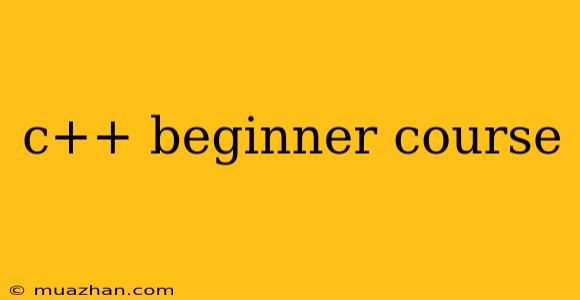C++ Beginner Course: Your Gateway to Programming Excellence
Are you ready to embark on a journey into the world of programming? C++, a powerful and versatile language, is a great choice for beginners looking to build a solid foundation in software development. This beginner course will equip you with the essential knowledge and skills to write your first C++ programs.
Why Learn C++?
C++ offers numerous advantages for aspiring programmers:
- Powerful and Efficient: C++ is known for its performance and efficiency, making it ideal for applications that require high speed and resource optimization.
- Widely Used: C++ is a cornerstone of various industries, including game development, operating systems, and embedded systems. Mastering C++ opens doors to a wide range of career opportunities.
- Object-Oriented: C++ follows an object-oriented programming paradigm, promoting code reusability and maintainability.
- Low-Level Access: C++ gives you direct control over system resources, allowing you to write code that interacts closely with hardware.
Essential Concepts for C++ Beginners
This course will cover fundamental C++ concepts, including:
1. Introduction to Programming:
- What is programming?
- Basic programming concepts: variables, data types, operators, expressions, and statements.
2. C++ Fundamentals:
- Setting up your Development Environment: Learn how to install and configure a C++ compiler and code editor.
- Basic Syntax: Understand the structure of a C++ program and learn to write simple lines of code.
- Data Types: Explore the different data types available in C++ and how to use them effectively.
- Operators: Learn about arithmetic, relational, logical, and bitwise operators and how to apply them in your programs.
- Input and Output: Understand how to interact with the user by taking input and displaying output using standard input/output streams.
3. Control Flow:
- Conditional Statements: Master the use of
if,else, andelse ifstatements to control the flow of your programs. - Loops: Learn about
for,while, anddo-whileloops to repeat blocks of code efficiently.
4. Functions:
- Function Basics: Understand the purpose and benefits of functions.
- Function Definition and Call: Learn how to define and call functions in your programs.
- Function Arguments and Return Values: Explore how to pass data to and receive data from functions.
5. Arrays:
- Array Fundamentals: Understand the concept of arrays and how to declare and initialize them.
- Accessing Array Elements: Learn how to access and manipulate individual elements within an array.
6. Introduction to Object-Oriented Programming (OOP):
- Classes and Objects: Explore the fundamentals of classes and objects as building blocks of OOP.
- Encapsulation: Understand how to encapsulate data and behavior within a class.
- Inheritance: Learn about the concept of inheritance and how to create derived classes from base classes.
- Polymorphism: Discover the concept of polymorphism and how it allows you to write flexible and reusable code.
Learning Resources
- Online Courses: There are numerous online platforms offering comprehensive C++ beginner courses. Websites like Udemy, Coursera, and Khan Academy provide structured learning paths with interactive exercises and quizzes.
- Books: C++ textbooks offer detailed explanations and practical examples. "C++ Primer Plus" and "Programming: Principles and Practice Using C++" are popular choices.
- Online Communities: Engage with the C++ community through forums, online groups, and Q&A platforms like Stack Overflow. You can seek help, share your learning journey, and collaborate with other programmers.
Practice Makes Perfect
As you learn C++, dedicate time to practice your skills.
- Solve Programming Challenges: Websites like HackerRank and Codewars offer a wide range of coding challenges that test your understanding of C++ concepts.
- Build Small Projects: Start with simple projects, such as a calculator or a basic game. As you gain confidence, you can tackle more complex projects.
- Contribute to Open Source: Participate in open-source projects to gain experience and contribute to real-world applications.
By consistently applying your knowledge and seeking opportunities to practice, you'll develop your C++ skills and become a proficient programmer.
This beginner course is a stepping stone to a world of possibilities. Embrace the challenge, have fun learning, and enjoy the rewarding journey of becoming a C++ developer!
